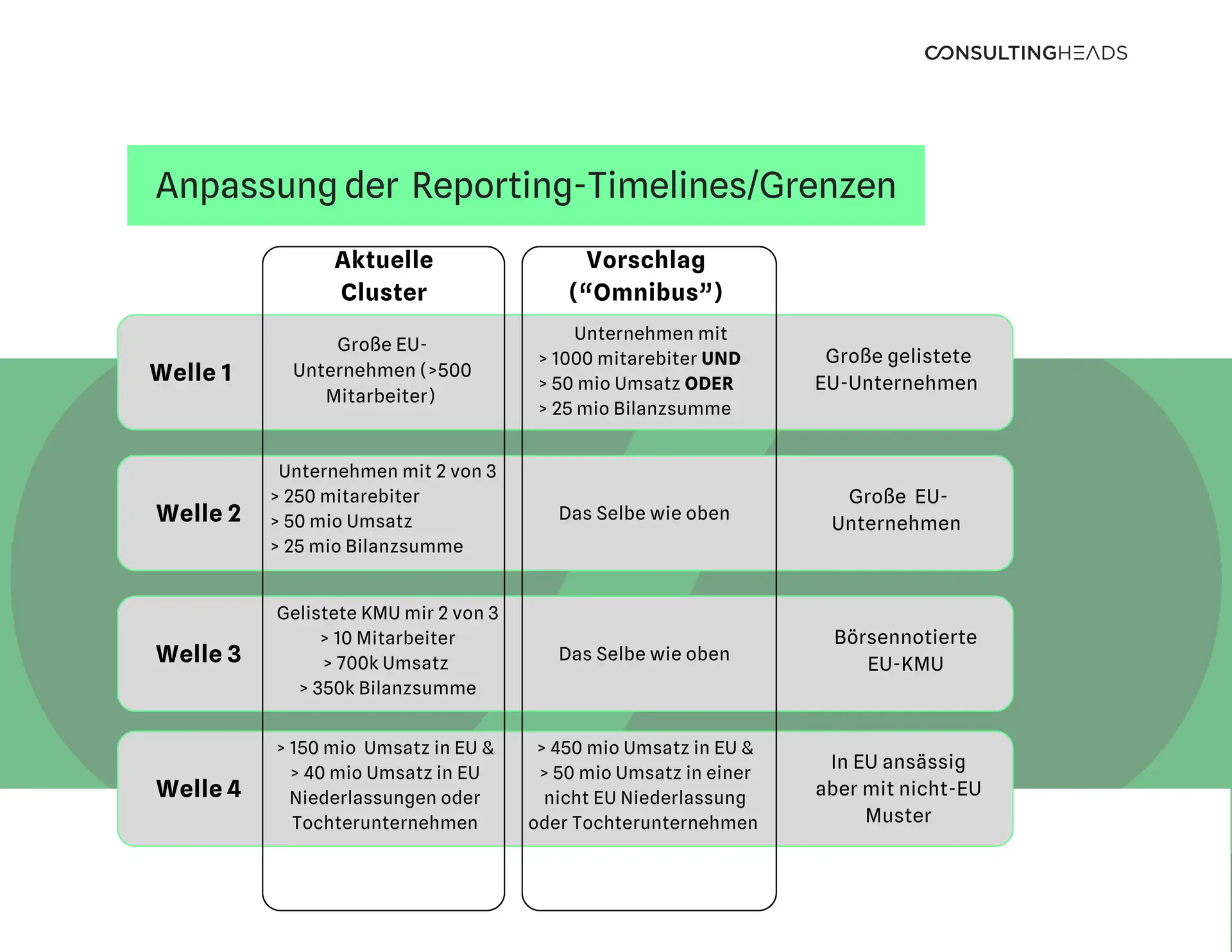The softening of regulation through the omnibus package – Is the change in business models towards more sustainability now less important?
What has changed?
With the announcement of the “omnibus package”, the EU Commission has caused a sensation in sustainability reporting. Deadlines for first-time reporting have been postponed, company key figures for reporting have been raised, the data points to be reported have been thinned out, future details in reporting have been completely discarded and the audit obligation will only have to be limited. What has happened and what does this mean in the context of companies’ shift towards greater sustainability?
In the last week of February 2025, EU President Ursula von der Leyen announced that sustainability reporting is to be simplified. The current regulations of the CSRD (Corporate Sustainabilty Reporting Directive), the CSDDD (Corporate Sustainabilty Due Diligence Directive) and the Taxonomy Regulation and CBAM (Carbon Border Adjustment Mechanism) will be combined in the so-called “omnibus package”. Specifically, the employee and turnover thresholds from which companies must report have been raised and the first-time reporting dates for companies that would have had to report from 2025 have been postponed by two years. The planned sector-specific, more extensive reporting, which should have been gradually introduced over the next few years, has been completely scrapped. In the supply chain, reporting companies only have to include direct suppliers in their reporting and the reporting periods will be extended to 5 years (originally annually):
The number of companies in Europe originally required to report in the 2nd wave will be reduced by an estimated 80%.
The background to this development is what the EU and the companies subject to the reporting obligation consider to be significantly excessive regulation, which would have simply overburdened small and medium-sized companies (with 250 employees or more, or even less in the third wave) with a considerable reporting burden. The additional resources that would have had to be maintained for data collection, documentation and reporting would have been added to customer prices, which would have massively impaired international competitiveness. At the same time, the auditors would have been overburdened and the internal processes in the companies would have been considerably delayed. Other implications have also contributed to the postponement or cancellation. The regulatory “pipeline” also includes the ESPR (Ecodesign for Sustainable Products Regulation), the GCD (Green Claims Directive) and other sustainability reporting regulations that are currently being drafted. These further increase complexity, but their introduction is not yet in question.
At the same time, however, the general requirements of the CSRD, which are set out in the ESRS (European Sustainability Reporting Standards) in the context of sustainability reporting and must be successively translated into national implementation legislation, remain unchanged. Only the time periods and the company sizes from which reporting is required are changing. The data points to be reported in accordance with ESRS will be significantly reduced (approx. 50%). The audit obligation will no longer have “reasonable” but only “limited assurance” requirements. The important analytical concept of materiality analysis (“double materiality”) will also be retained and must be applied continuously in order to demonstrate the change towards greater sustainability in companies.
What does this mean for companies, including those below the reporting thresholds?
The companies currently subject to reporting requirements will continue to expand, perfect and detail their reporting. According to surveys, not all companies that are currently required to report have reached the target status. However, the companies that have now been granted a time extension and the companies that are no longer required to report should not rejoice too soon. The basic idea behind the Green Deal and the Taxonomy Regulation is that all companies, regardless of their size, should gradually develop in the direction of sustainable companies via the reporting requirements. In addition to reporting, this should be achieved on the one hand by creating transparency in the relationships arising from the supply chains (LkSG [für deutschland=”Lieferkettersorgfaltspflichtengesetz”] and CSDDD), but also by obliging all financial service providers to increasingly channel their funds into exclusively sustainable business models. As a result, financial service providers are not experiencing any easing of the regulatory obligations that apply to them (including SFDR – Sustainable Financial Disclosure Regulation).
Based on this logic, all companies – including medium-sized and smaller ones – will have to gradually come to terms with the sustainability requirements despite the postponement or discontinuation and review or change their business models more closely with regard to sustainability. Although this will no longer have to be done in detail, a basic understanding of sustainability principles, methods and regulatory requirements is essential.
What is sustainability still worth to companies today?
In recent years, the word “sustainability” has suffered considerably in terms of its recognition by companies and its esteem in society. This was partly due to excessive regulation, but also to the economic consideration that the transformation to greater sustainability is associated with significant costs. The latter is true and should not be denied: Sustainability transformation always costs money in the first few years! Costs are incurred for adapting the strategy, for structural and procedural changes, as well as for training employees and for the necessary cultural change. At the same time, this investment should be seen as necessary and economically sensible from the company’s point of view. Companies that operate sustainably are more profitable, more durable and more interesting from a stakeholder perspective. Their stock market indices are more stable, they are less volatile and are valued by customers, employees, suppliers and banks. This has been proven in countless scientific studies, analyst observations and M&A reports.
So what advice should companies be given?
First of all, you should not believe that a change to a more sustainable company no longer makes sense. The opposite is the case. You have merely subjectively gained a little more time. You should use this time to create a sustainability agenda for yourself. This sustainability agenda, which can be created in 3-4 months, addresses four key dimensions. It lays the foundations for sustainability reporting (1.), but also defines the content for internal (2.) and external (3.) communication with all stakeholders and banks (4.). Even if a company is not – or not yet – required to report, it should have a certain basic understanding of the reporting requirements, as these will inevitably be imposed by the requirements of the larger suppliers and customers in the supply chain.
Many studies have shown how important a company’s own definition of sustainability (“purpose”) is and how this should be translated into a business case. It is advisable for every company management to deal with the basic concepts of sustainability, understand them and gradually apply them in their own company. A change in a company towards more sustainability should always be intrinsically motivated by the company itself and not externally imposed by consultants, banks or the regulator. Sustainability experts can explain the concepts and provide assistance in the process, but the task of change will remain the responsibility of the company leaders (board members and managing directors).
The moment business leaders recognize the impact of their company in the context of creating value for a more sustainable economy and understand the relevance of their actions for the environment and society, they will drive the continuous change of their company. They will realize – like many others before them who have started on this path – that this change can make friends, that it can continue to earn good money and that the company can be set up for the long term. And they will realize that the change to sustainability is a “journey” that never ends. With this realization, they will be ahead of many business leaders and will be recognized as the true sustainability experts.








